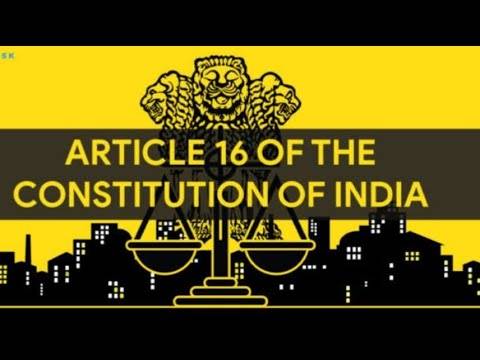EQUALITY OF OPPORTUNITIES IN MATTER OF PUBLIC EMPLOYMENT
INTRODUCTION
Right to Equality is one of the important fundamental rights that the constitution of India assures to all or any or any the citizens of the country. Article 16 deals with the equality of chances in matters of public employment. Civil right could also be a term which has varying definitions and there is no consensus on the exact meaning . Equal Employment Opportunity (EEO) principles apply to:
- Access to jobs
- Conditions of employment
- Relationships within the workplace
- The evaluation of performance and
- The opportunity for training and career development.
“Article 16 of the Indian Constitution is an example of the implementation of the general rule with special recommendation to the hope of appointments under the State. It says that there shall be no partiality of opportunity for all citizens in matters concerning appointment to any office under State. If it stood alone all the backward communities would attend the wall in a society of uneven basic social organisation.
What Article 16 assures is equality of chances in matters of chances in State services. Equality of opportunity connotes that each person of country shall be eligible for employment or appointment to any office under the State consistent with his qualifications and capability held by the Supreme Court. Article 16 therefore doesn’t prevent the State from prescribing the specified qualifications and selective tests for recruitment of state services.
ARTICLE 16:
Equality of opportunity in matters of public employment:
(1) There shall be equality of chances for all citizens in matters regarding employment or appointment to any office under the State. The rule apply only in concern of employments or offices which are liable under the state. i.e., the person holding office as lower to the state. The clause accordingly, doesn’t prevent the state from laying down the requisite qualifications for recruitment for state services, and it’s hospitable the authority to urge down such other conditions of appointment as would be conducive to the upkeep of proper discipline among the servants.
The qualification highlighted may, besides mental excellence, include fitness , sense of discipline, moral integrity and trust to the state. Considering the case of M Thomas v State of Kerala, Justice V.R Krishna Iyer , acknowledged the experience of reservation in practice showed that the advantages were, by and large, snatched away by the absolute best creamy layer of the backward classes or therefore keeping the weakest always weak and leaving the fortunate layers to grab the entire cake.
(2) No citizen shall, on reason only of reliability race, caste, sex, descent, place of birth, home or any of them, be unqualified for, or partial opposition in respect of, any employment or office under the State. The illicit grounds of discussions are religion, race, caste, sex, descent, place of birth, residence, or any of them. Any employment or office under the State make it clear that Article 16(2) also applies only to public employment.
When is that the Reservation Allowed To The Backward Class?
Other Backward Class (OBC) could even be a collective term employed by the government of India to allocate castes which are educationally and socially disadvantaged. It’s one of several official classifications of the population of India, in conjunction with Scheduled Castes and Scheduled Tribes (SCs and STs). The more important question is to what extent the social policy programmes supported irrelevant criteria like caste and religion should be allowed to override merit and efficiency criteria.
Aristotle writes, “Injustice comes when equals are treated unequally and also when unequals are treated fluctuately ”. Selecting the proper basis of distribution for making preference isn’t free from problems. It’s been suggested that individual need, status, merit or entitlement are beat appropriate circumstances, proper bases of distribution of benefits . Everyone will agree that for getting admissions during a medical college – where seats are limited – merit is an appropriate criterion. Now, exclusion of potential candidates on grounds apart from merit is obvious denial of equality of opportunity.
Are Articles 15(4) And 16(4) Exceptions?
On a clear reading of Articles 15 and 16 one is perhaps getting to make the sense that clause (4) of Article 15 is an exception to the remainder of the provisions of that article and to clause (2) of Article 29 which clause (4) of Article 16 is an exception to the rest of the provisions of that article. In other sense, while clause (4) of Article 15 permits what the lie of that article or clause (2) of Article 29 forbids, clause (4) of Article 16 permits what the balance of that article prohibits.
CONCLUSION:
The slogan “equality of opportunity” commands wide allegiance among the members of up so far societies. Under analysis , equality of opportunity divides into different ideals, variety of them being opposed rivals. It’s controversial which of these ideals are morally acceptable, and which should be coercively enforced the perfect of a society during which people don’t suffer disadvantage from discrimination on grounds of supposed race, ethnicity, religion, sex, sexual orientation is extensively upheld as advisable in itself. For many, the perfect is more compelling than any argument which may be offered to support it as requirements of justice. Castism” are making serious inroads into stage of the general public services. The Central Government has been taking serious measures to translate the perfect embodied in Article 16 into practice. It convenes a conference of State Ministers of Backward Classes with a view to assessing the measures already taken and suggesting necessary modifications to supply better results. Expeditious industrialisation and the availability of plenty of new jobs along with a simultaneous growth of educational opportunities for the backward sections as well as alter in the outlook and attitude of those classes and groups which hold a traditional monopoly in public services will gently ease the realisation of the ultimate objective of equal opportunity in public services.
Author: Ananya Kashyap,
Symbiosis Law School, Nagpur/ 1 year

